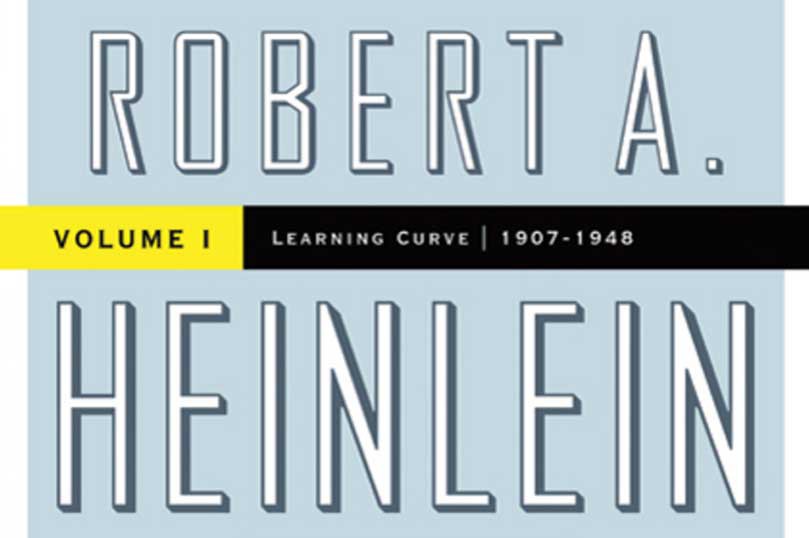Welcome to Throwback Thursdays on the Tor/Forge blog! Every other week, we’re delving into our newsletter archives and sharing some of our favorite posts.
In 2010, we published the first of a two volume biography of one of the giants of science fiction: Robert A. Heinlein. At that time, we had an idea: why not ask our authors about their favorite Heinlein novels? Tor editor Stacy Hill was our shepherd for this series, and updates us on our journey.
From Tor editor Stacy Hill: In August, Tor will be releasing an all-new biography of a singular figure in the history of the genre: Robert A. Heinlein. This will be the first-ever authorized biography, and it’s a fascinating look at a famously private man.
As our own little celebration of Heinlein and his works, we thought it would be fun to find out just how much of an impact Heinlein’s stories and novels had on a number of our—and your—favorite sf writers. We asked them a simple question—what’s your favorite Heinlein novel?
We’ve been posting their answers once a week as we head toward publication of the biography and so far we’ve heard from opens in a new windowDavid Brin, opens in a new windowDavid Drake, opens in a new windowDavid G. Hartwell, and opens in a new windowL.E. Modesitt, Jr. Additionally, we’ve been picked up by opens in a new windowTor.com and opens in a new windowBoing Boing, and Cory Doctorow has been opens in a new windowposting notes on the biography. In the coming weeks, you’ll see contributions from Michael Swanwick, Charles Stross, and many more.
Thanks to all of you who have jumped in to tell us about your favorites: opens in a new windowThe Moon is a Harsh Mistress, Starship Troopers, Stranger In a Strange Land, and JOB are just some of the novels discussed in the comments so far. What other Heinlein novels do you all love?
What’s Your Favorite Robert A. Heinlein Novel, L.E. Modesitt, Jr.?
I’m certain, that, if asked, more than a few readers will list Robert A. Heinlein’s Starship Troopers as one of their favorite novels… and more than a few others will denounce it vigorously as a fascist military dystopia, no matter how the semi-libertarian Heinlein portrayed “our” future society. I’m one of those who happens to like it, because, after having been a military pilot and having served as a political staffer in Washington, D.C., Heinlein’s insights into both the military and into what supports workable government and what does not seem to me, at least, to be validated by what I’ve observed in politics and government over the past several decades. At its core, Starship Troopers examines what is required for effective and responsible government. For Heinlein, those who govern must pay a price for that privilege, and since he believes in broad-based governance, that means that every member of the electorate must pay through a term of military service. He doesn’t require military service, and no one is forced to serve, but if you don’t serve, you can’t vote, and you cannot be elected to public office. Interestingly enough, Heinlein does not suggest that this future society is optimal – only that it will work.
What is often ignored by those who criticize Starship Troopers is the fact that Heinlein was literally only fictionalizing the predictions of earlier scholars and politicians, such as deTocqueville and MacCauley, who predicted that any democracy would eventually fail because too great a proportion of the electorate would vote themselves greater and greater benefits without having paid for them in one way or another. Yet few criticize those who first made those points, which may also demonstrate why fiction is often more powerful than either scholarship or rhetoric directly from politicians.
What I also find amusing is that, in a sense, the military draft in place at the time that Heinlein wrote the book was in fact considered a price of “freedom” during World War II and immediately thereafter. In the Vietnam era that followed, however, the wide-spread use of educational deferments placed that price disproportionately on the less-advantaged males in American society, one of the factors leading to the abolition of the draft, in turn effectively repudiating any idea that citizens owed any moral debt to society, which was, of course, Heinlein’s point in his fictionalization of a future collapse of American government.
The other basic point underlying Starship Troopers is the idea that, like it or not, force in some form determines whether societies survive, and that any society that fails to understand that is doomed to fail. Heinlein was not, in fact, glorifying force, at least not as I read the book, but looking back through history and pointing out that such was the pattern human societies had exhibited from time immemorial. In presenting a biologically and socially very different culture in the “Bugs,” he was essentially postulating that any intelligent species would be both aggressive and territorial… and interestingly enough, I’ve recently read several scholarly articles suggesting the same thing, although the scholarly types use the term “predatory.” To me, that’s aggressive and territorial.
In the end, in Starship Troopers, Heinlein offers, if through a glass darkly, a fairly accurate picture of human faults, foibles, and virtues…and that may well be why some don’t like the book… and why I do.
L.E. Modesitt, Jr. can be found online at https://www.lemodesittjr.com
This article is originally from the August 2010 Tor/Forge newsletter. Sign up for the Tor/Forge newsletter now, and get similar content in your inbox twice a month!


